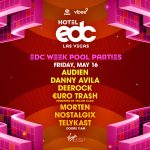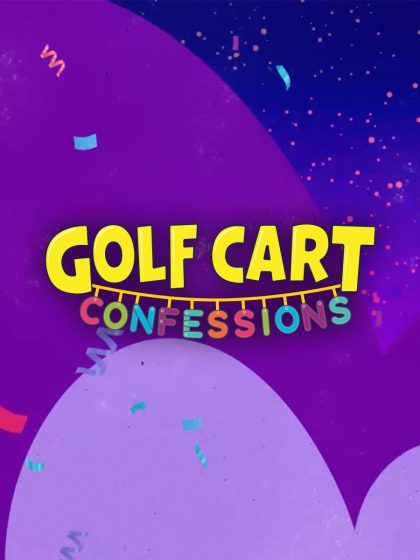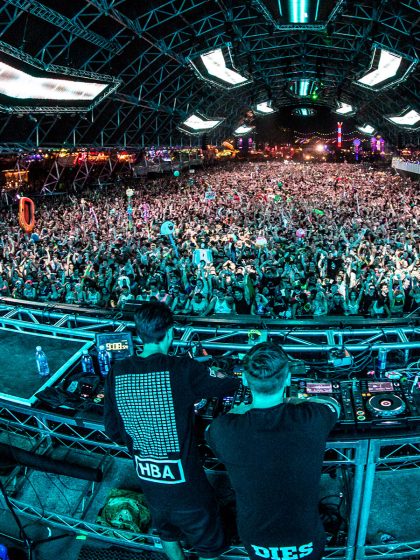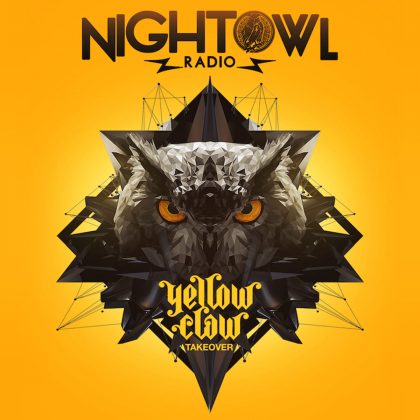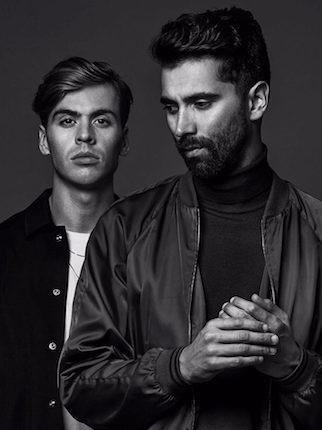Yellow Claw Talk Beats and Business
Upcoming Event
On this gorgeous Los Angeles morning, it’s nothing but clear skies and congestion on the road. I’m fighting against rush-hour traffic to meet up with Yellow Claw before they head out to log some studio hours. The trap-slingin’ trio are currently clawing their way toward their highly anticipated debut LP, Blood for Mercy, and the last thing I want is for the Dutch dudes to be waiting on me.

As soon as I arrive to their temp home for the week, Jim greets me and guides me upstairs, where his production partners MC Bizzey and Nizzle are waiting to scarf down some bfast before the day’s music sesh. Between a demanding tour sched, running their Barong Family imprint and spearheading the Blood for Mercy merch line, it would seem like there’s not enough time in the day for YC to take over the world one turnt tune at a time. Yet, they still are scratching off the objective that lies in front of them.
It’s clear that all the guys can think about is crafting their next genre-melding banger, so I don’t waste another second to talk beats and business with Yellow Claw over breakfast.
“People can play it in their cars; white chicks can dance to it in their dorm.”
I read somewhere that you guys started making beats because you were tired of the sound that was dominating the scene in the Netherlands at the time.
Nils: It was more like we had our own evening at Jimmy Woo, and there wasn’t enough music for us to play that was good for our parties. So, we just created our own music. We didn’t even know it was called “trap” at that time.
Leo: We just started experimenting a lot back then with all the 75-BPM hip-hop, but also with stuff that came on the radio—like Ludacris “How Low” kinda shit. Then we’d mix it up with dubstep stuff from the UK. That’s when we created a rougher sound.
You started messing around with festival trap right when it was barely starting to catch on.
N: We already did it, and then it was given a name. There were no festival trap remixes back then.
It’s definitely come a long way since. How would you describe the current state of trap?
Jim: I think it’s kind of like the cooler side of the track of big-room EDM. I think it has proven it has a life of its own. It’s gotten bigger than most people thought it would. Sometimes we play parties, and there are a couple of scenes coming together there. People can play it in their cars; white chicks can dance to it in their dorm. It’s gotten pretty universal—maybe even a bit more universal than the mainstream EDM stuff.
What forces do you think are at play that are pushing trap into the foreground?
J: In the States, you guys have a big cultural history with hip-hop, so people are really feeding that hip-hop vibe because they grew up with it. It’s a hip-hop version on steroids, and it’s easy to adapt to. The whole scene is still not as big in Europe as it is in the States, ‘cause we don’t have that hip-hop history. We have a lot of old-school electronic music like hardstyle and other stuff happening. For us, it’s cool because we like bringing them all together.
Do you feel like the underrepresentation of hip-hop in Europe will hinder the growth of trap overseas?
J: No, not really. In Europe, it’s just yet another form of electronic dance music. We already have like 20-something genres, so this is just another one of those.
Do the preferences toward hip-hop in America versus Europe have a noticeable influence on the type of sets you perform at each market?
J: No, we only play our own shit, so it doesn’t matter for us.
There’s a clear line being drawn here between the DJ and the performer.
L: It’s our ambition to become more than just a DJ.
N: Not just ambition; DJing is such a small part, compared to making music or being an artist. We just like to create music we like to perform.
You each have your own role in the studio. Do you think the division of labor helps streamline the process, or does it make overcoming disagreements more challenging?
J: At the end of the day, it doesn’t really matter who does what in the studio. We have tracks that some of us didn’t even touch, then there’s stuff where all three of us have written multiple times. There are always three opinions and constant feedback. There’s never a day where one of us is not in the studio. We even got double studios now. There’s a lot of time where there’s a collab going on in this studio and an original going on in that studio.
Does every decision have to be unanimous, or is there an option to throw out a veto?
J: It has to be unanimous.
N: Absolutely. You can’t put on a show and not feel your own music.
J: We do 20 to 25 shows a month, so there’s a lot of space to convince the other guys, like, “Come on, just play the song.” It happens often where something in the studio doesn’t feel right for one of us, and then when it’s played out there, everybody goes, “Ahh!”
N: Or even the other way around, like, “I’m really fucking into this track!” and you play it live, and people are really confused. It happens.
J: And then the rest of us are like, “We told you! This is all you.”
Do you road-test your tracks often before dropping them?
L: Nonstop.
How many WIPs/unreleased tracks would you say you’re sitting on at the moment?
N: Like, 25. It’s for the album, so it’s at a high point.
J: We have to stop each other from playing stuff.
L: It’s hard. When you’re at the studio all day and you have a show at night, the first thing you want to do is try it out. But you can’t.
J: At a small club somewhere far-out, you can try more stuff. But at Coachella or Ultra, you know your set is going to be recorded. So if you play something that won’t be out in half a year, it doesn’t make sense.
N: Everything is going to be on the internet, but we didn’t understand it back then. Before we played EDC Vegas, we finished up the demo version of “Till It Hurts.” We were like, “We shouldn’t play it.” We really discussed it, like, “OK, it’s going to be all over the internet if we play it.” And we were like, fuck it; it might be a good thing, because the release date is only in a couple of months. We were really thinking about all the consequences.
“When you have some buzz, everybody wants to be your friend.”
Speaking of the internet, it played a huge role in helping you blow up, seemingly overnight, considering you were without a manager or a major record deal when you first gained significant traction. What advice would you give budding producers who are interested in following the same business model?
L: Don’t put anything stupid out. When you put something up on your SoundCloud, make sure you’re 100 percent behind it. Just make quality stuff, and people will see it.
N: I would say, don’t trust the promises people make, and just be patient. Take those in-between roads instead of the highway on somebody else’s back for a big percentage. Just don’t sign anything.
J: Don’t try to make anything that’s already there. If you do one show a month, you don’t need a booker. If you have two songs on SoundCloud with only eight followers, you don’t need a manager. Get your shit together first. We meet all these kids, they’re like 17 years old with one track bumpin’ on a blog, and then they go sign a management deal and think, “Oh man, I’m gonna be rich.” In the end, none of those people are going to do anything for you.>
L: It just makes it harder for you to collaborate with other people, because there are so many other people in front of you.
J: Learn how this business works. Read your own contracts. It’s your business in the end. It’s you. You can’t rely on a bunch of people. When you have some buzz, everybody wants to be your friend. But it’s going to end somewhere, and then there’s going to be the next guy with buzz. And if you don’t know shit about what you’re doing, you’re going to get stuck.
It pays to be your own boss, which is why you took the initiative to launch your own label and spearhead your own clothing line, on top of already producing and performing. It looks like you have almost every angle covered. Are there any other aspects of the industry you’d like to tackle?
L: The toy industry.
I saw the Yellow Claw figurines you used in the trailer for your Mixtape 8. Is that the next enterprise?
N: Well, that was just a fun little project. It was just a joke.
L: I think we’ve already tackled everything we need to.
N: We ran out of time. We need to just focus on the music.
L: Anything more wouldn’t make much sense.
Fair enough. At last year’s EDC New York, you premiered your “DKNY” track. Do you have any surprises lined up for this year’s EDC?
N: I’m going to be honest with you: We haven’t really talked about it. But we have to.
New York must be special to you, because it’s the city where you made your US debut.
N: There are a couple of cities we especially love because of the atmosphere, and New York is one of those places.
L: We started out doing a show for 250 people,or maybe even less. And not long after, we showed up to the same venue and brought out like 3,500 people.
EDC New York is May 23-24. Get your tickets now!
Follow Yellow Claw on Facebook | Twitter | SoundCloud

